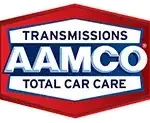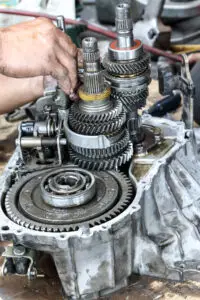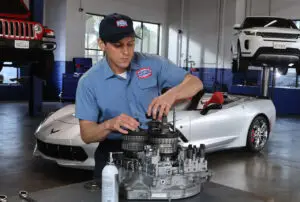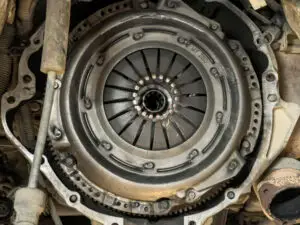Grumbles, shakes, and shudders — when transmission trouble starts, which repairs or services might your car need? From maintenance like a fluid service to more serious repairs like a rebuild or replacement, it can be tough to keep it all straight and know what to expect when you head to a mechanic. How can you tell what your car’s transmission may need? It helps to pay close attention to which symptoms you notice, how long they’ve been happening, your recent driving habits, and how long it’s been since your last inspection, service, or repair.
Transmission Fluid Services
Your car’s regular maintenance schedule should include transmission fluid services, but will also depend on your vehicle manufacturer. Replacing your transmission fluid at regular intervals helps optimize performance and prevent excess wear or damage each time you drive. The recommended interval varies depending on the make and model of your vehicle, your driving habits, and the climate where you live. Choosing between a fluid replacement or flush often comes down to how long it’s been since your last service and whether you’ve noticed any major changes in performance.
When Should You Schedule a Transmission Fluid Replacement?
A simple but essential maintenance service for your transmission — fluid replacement services should be scheduled every 20,000-100,000 miles. Check your owner’s manual for vehicle-specific intervals, but it’s a good idea to have your transmission fluid checked annually once your car reaches 20,000 miles. This service involves draining the old, degraded fluid and replacing it with new, which removes most of the debris and contaminants that build up over time. When it comes to transmission services, this is one of the simplest and least costly, so you can expect to pay no more than $400-500.
When Should You Schedule a Transmission Fluid Flush?
As an alternative to a simple fluid change, a transmission fluid flush service is quicker, more thorough, and can be cheaper. Especially if you’re overdue for fresh transmission fluid, a flush will help fully remove all contaminants, helping to keep the new fluid fresher for longer. This service requires special equipment, so it’s essential that you trust a professional mechanic with the task rather than attempting it at home. Because it’s quicker than waiting for the old fluid to drain, a transmission fluid flush may also be a cheaper option, potentially costing you closer to $200.
Torque Converter or Clutch Repairs
Depending on the type of vehicle you drive, either the torque converter or clutch is responsible for facilitating gear shifts. In either case, it’s beneficial to schedule annual inspections, especially as they age and have higher mileage. Hard acceleration, bad timing when using the clutch pedal, shifting in or out of reverse while your car is still moving, or frequently towing heavy loads can all speed up wear on your clutch or torque converter. If you notice difficulty shifting gears, new sounds while driving, or sudden jerking or hesitation during acceleration, it’s time to have your car’s torque converter or clutch inspected for repairs.
When Might Your Automatic Vehicle Need a Torque Converter Repair?
If you drive an automatic transmission car, a torque converter is working in tandem with the transmission to adjust how much power is sent to the drive wheels. Within the torque converter, there may be damaged turbine blades or thickened, old fluid that can’t properly flow. Your mechanic may start by recommending a transmission fluid change, but also closer inspection of components within the torque converter. A new torque converter will likely cost between $150-500 just for the part itself, plus a few hours of labor.
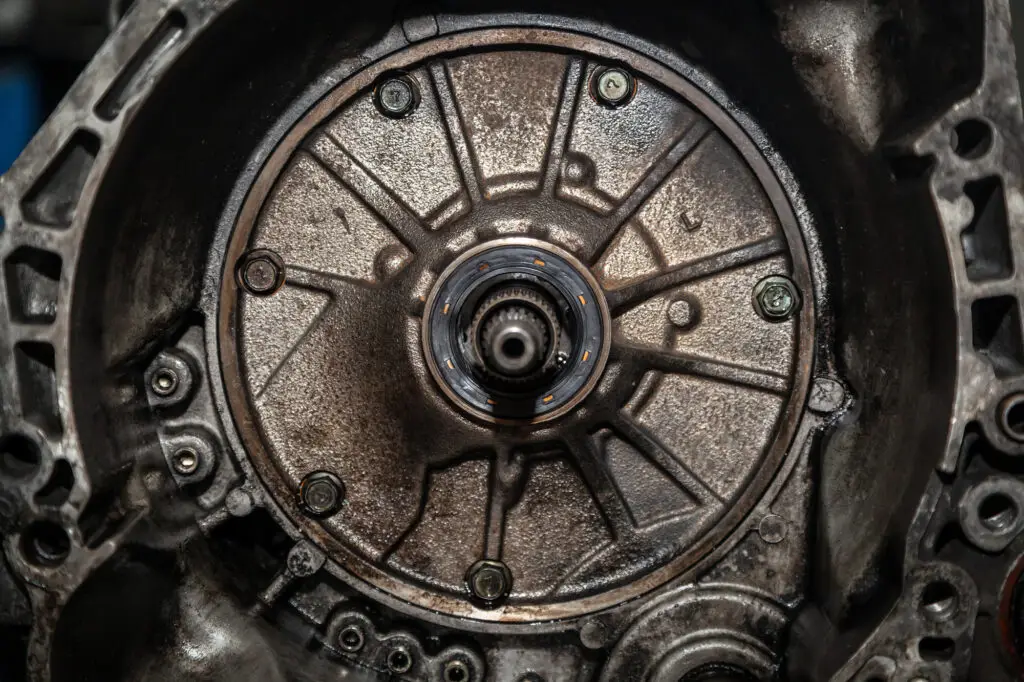
When Might Your Manual Vehicle Need a Clutch Repair?
If you drive a manual transmission car, the clutch is responsible for disengaging the transmission from the engine so that gear shifts can take place. As the driver, you control this using the clutch pedal. When clutch components start to wear out, you may notice engine revving without power, grinding gears, rough or difficult gear changes, or inconsistent clutch engagement. Depending on your vehicle and whether individual components can be replaced or an entirely new clutch is necessary, it may cost anywhere from $750-2,500.
Transmission Rebuild vs Transmission Replacement
More extensive issues within the transmission may not be solved with just a fluid replacement. While there may be simpler repairs, such as replacing a faulty solenoid, which can cost just a few hundred dollars, when several components need to be replaced, a rebuild or replacement is necessary. At this point, you and your mechanic will balance the cost of parts and labor, how much time you can be without a car, and the importance of hand-selecting individual components to decide which is the better option for your vehicle.
Less Extensive Damage May Be Fixed with a Transmission Rebuild
Ultimately, a transmission rebuild will cost you less than a replacement, though it can take several days to complete. With this option, you also want to be sure you bring your vehicle to a transmission expert who knows exactly what to do and look for within the system. During a rebuild, your transmission will be fully removed from your vehicle, disassembled, cleaned, and any worn parts replaced. Generally, this will be the better option if the number of faulty components is relatively limited.
More Extensive Damage May Require a Transmission Replacement
When there’s more extensive damage within the transmission or you need your car back quickly, you may opt for a full replacement instead. In this case, a remanufactured transmission will be installed in place of the old, faulty system. Where you save on labor costs, you’ll pay more for parts. However, this new transmission should last another 100,000 miles or more when properly maintained.
AAMCO: Your Experts for Any Transmission Service
At AAMCO, we believe a necessary transmission repair doesn’t have to break the bank. Regular maintenance like fluid changes can help keep the system operating efficiently — but it can’t always fully prevent more serious repairs. If you’re facing major repairs like a transmission rebuild or replacement, visit your local AAMCO and our expert mechanics will help. Qualifying customers can also take advantage of financing options to help get your car back on the road again without digging into savings. Schedule your appointment with us today!
